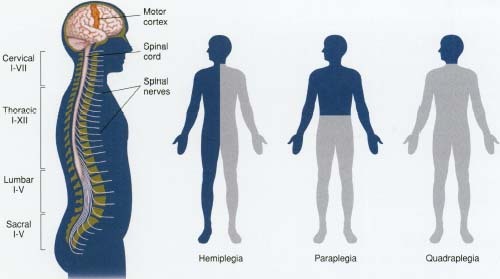Hemiplegia
From Psy3242
(Difference between revisions)
(fixed resources) |
|||
| Line 1: | Line 1: | ||
[[Category:Neuropsychological syndromes]] | [[Category:Neuropsychological syndromes]] | ||
| - | Hemiplegia describes the condition of a brain damaged individual who is unable to intentionally move parts of his or her body on the side opposite that of the brain damage. Hemplegia usually occurs as a result of a loss of blood supply in the mid-cerebral artery due to aneurysm, hemorrhage, or clot. It may also be caused by a head injury, | + | Hemiplegia describes the condition of a brain damaged individual who is unable to intentionally move parts of his or her body on the side opposite that of the brain damage. Hemplegia usually occurs as a result of a loss of blood supply in the mid-cerebral artery due to aneurysm, hemorrhage, or clot. It may also be caused by a head injury, epilepsy, and/or tumor. In addition, damage to subcortical structures, such as the basal ganglia, may result in hemplegia, since such structures are often served by the mid-cerebral artery. |
[[Image:Example.jpg]] http://www.humanillnesses.com/original/images/hdc_0001_0003_0_img0192.jpg | [[Image:Example.jpg]] http://www.humanillnesses.com/original/images/hdc_0001_0003_0_img0192.jpg | ||
Revision as of 23:55, 1 April 2008
Hemiplegia describes the condition of a brain damaged individual who is unable to intentionally move parts of his or her body on the side opposite that of the brain damage. Hemplegia usually occurs as a result of a loss of blood supply in the mid-cerebral artery due to aneurysm, hemorrhage, or clot. It may also be caused by a head injury, epilepsy, and/or tumor. In addition, damage to subcortical structures, such as the basal ganglia, may result in hemplegia, since such structures are often served by the mid-cerebral artery.
Resources
- NIH site
- Online encyclopedia site
- Stirling, John. Introducing Neuropsychology
- Ogden, Jenni A. Fractured Minds: A Case Study Approach to Clincial Neuropsychology

